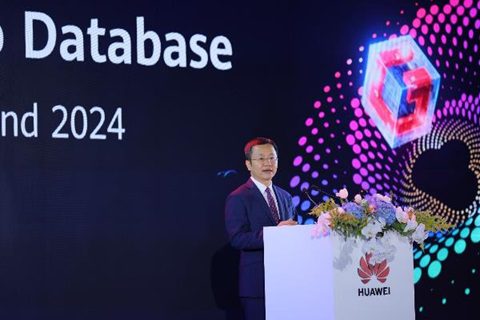The digital revolution is transforming everything around us. As online and mobile services continue to boom at a rapid rate, we are starting to see more and more intelligent technologies, such as AI applications, being utilized and deployed across different industries around the world. As Thailand aims to be the digital hub of ASEAN in the near future, the country will need strong digital infrastructure to support all intelligent technologies that will be a part of digital transformation processes across the country. Database technology in particular is one of the most important foundations for the digital revolution wave, as databases have been the backbone of industrial digitalization for thousands of industries over the last five decades. But how will new database technologies help fully unleash real value for Thailand in the era of Big Data and AI?
Mr. David Li, CEO of Huawei Technologies (Thailand) Co., Ltd., gave an interview regarding the next generation of databases: “For many vertical industries and the banking industry, real-time applications have become increasingly popular. In addition, online transaction demand is very high for most industries, with banks seeing millions of online data traffic transactions. Everyone’s lives have become digitalized, which means that a lot of applications will need to provide local services with local systems and ecosystems. As a global leader in digital solutions, Huawei will help cultivate ecosystems for local partners and will also serve vertical industries and the government. Huawei is a confident investor in terms of data centers, and business has been good as we already have 3 local data centers in the country. Through this, we would like to emphasize both our long-term commitment and confidence in Thailand.”
At present, there are four main challenges for database technology. First, how to process massive, distributed, and heterogeneous data. To handle the situation, there will need to be a database that can seamlessly scale up and adapt to multiple workloads. Second, how to maintain high performance under high concurrent processing, as there is an increasing demand for real-time applications and online transactions from banks and other industries. Third, how to ensure comprehensive security and address the challenges of data breaches and cybersecurity — an issue highlighted by the total cost of global cybercrime reaching $8 trillion in 2023 and predictions that this will hit $10.5 trillion by 2025. And fourth, how digitalization trends in all industries demand a rich local digital ecosystem and local system integrators, software developers, and applications as essential factors.
Thailand is very strong in terms of the number of digital users, but it still lacks digital creators. This is a dilemma in developing countries during the digitalization era as many have adopted digital technologies but did not anticipate the capabilities required to create and cultivate local digital ecosystems. However, Huawei sees high potential for Thailand as the Thai Government is committed to many initiatives that will support digital ecosystems and is already aware of the challenges. In addition, Huawei can see that public and private sector awareness about the importance of digital technology has increased tremendously and that all parties are committed to investing in digital infrastructure. The demand for databases is very high in many vertical industries which is a good sign, as when there is investment, there will be more job opportunities as well.
This is why Huawei is committed to investing in the country and to keep cultivating digital talents and local digital ecosystems, as it is an important part of the digital transformation process for the country. In addition, Huawei will continue to focus on showing the benefits from its ICT investments and bringing next-level technologies to Thailand to support higher demands in government, transportation, banks, and other industries.
Mr. David Li added that Huawei has been investing in Database root technology for 20 years and recently introduced GaussDB – Huawei’s next-generation distributed database – to Thailand, offering a powerful solution to unlock the full value of data. This will help Huawei support and work with local partners in Thailand as GaussDB can be deployed both in private and public cloud. In addition, the deployment of next-generation databases such as GaussDB will help strengthen current intelligence solutions by improving efficiency and will bring additional benefits to various industries to help cultivate Thailand’s overall digital ecosystem.
GaussDB previously launched in the Chinese market in order to test and refine the technology. Once the solution had matured into a strong and beneficial product, Huawei launched the solution in Thailand as one of the first international markets under Huawei’s pioneer programs to support local partners and institutes. Huawei firmly believes that GaussDB can help transform the database market by providing a better choice for many industries.
Recently, Huawei Cloud becomes the world’s only cloud service vendor (CSP) who was named as a Customers’ Choice for 2023 on Gartner Peer Insights™ ‘Voice of the Customer’ in this market. Huawei Cloud will continue to dive into technology innovation, employ more product capabilities for business practices, helping customers build more reliable, agile, and high performance intelligent data foundations. Huawei has been deeply rooted in Thailand for 24 years and is strongly committed to Thailand’s digital development in line with its commitment to ‘Grow in Thailand, Contribute to Thailand’. Looking forward with its ‘Lead Everyone Froward, Leave No One Behind’ mission, Huawei will continue providing cutting-edge database and other intelligent solutions that foster growth, efficiency, competitiveness, as well as fostering local collaborations with the aim of advancing intelligence technology, facilitating digital transformation, and contributing to Thailand’s digital economic growth, helping drive Thailand to become a future digital hub of ASEAN.

